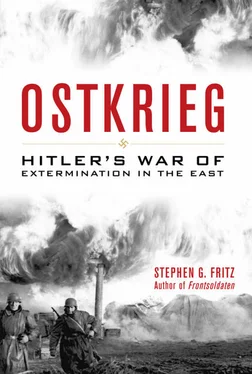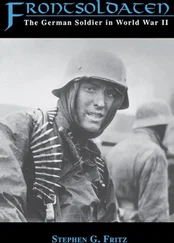Related to this was Hitler’s obsession with World War I as well as his realization of the looming potential of the United States. The first war colored all aspects of the second one for Hitler. The ruinous blockade that accentuated German deficiencies in food and raw materials, the searing memory of mass hunger and privation that sapped domestic morale, the actions by the so-called November criminals (Jews, Communists, socialists) that allegedly caused the collapse of the German war effort, the belief in an active “Jewish conspiracy” that had plunged an encircled Germany into war in the first place—all would have repercussions on the direction of “his” war, a war fought primarily to undo the results of the first. This second war could not be fought in a vacuum, however, because of the hulking presence of potential American power, which put significant time pressures on Hitler. The logic of many of his decisions, in fact, stemmed from his acute awareness of German deficiencies and the limited window of opportunity available to remedy the situation. To secure German hegemony in Europe, ironically, he first had to conquer the necessary resources and ruthlessly exploit them for his own purposes, a scenario fraught with vulnerability and danger.
A further theme, then, would be Germany’s large-scale unpreparedness for war against the Soviet Union. While Stalin’s hugely ambitious industrialization plans had turned the Soviet Union into the most gigantic military-industrial state in modern history, Hitler’s rearmament had begun much more slowly than originally believed and by 1939 had brought Germany barely level with its western rivals, Britain and France. Although Hitler had blundered into a war for which his nation was ill-prepared, he had been saved by the twin good fortunes of Allied incompetence and the luck of a blitzkrieg attack that went largely according to plan. The latter, however, obscured the fact that Germany had enjoyed no material advantage over its western rivals, let alone vis-à-vis the Soviet Union. The myth of the Wehrmacht—that it was an invincible, mechanized juggernaut that had devised a war-winning strategy—was just that, a myth. The German army that assaulted the Red Army a year after its great triumph in France was barely stronger yet had to contend with a much larger foe in a vastly greater space. It could, in fact, project its power no farther than three hundred miles, a sobering fact when Moscow lay some seven hundred miles to the east, with the vital resources and oil of southern Russia even more distant. Nor was the German armaments industry, suffering from serious shortages of labor and raw materials, prepared for the rigors of a long campaign. With a few motorized divisions trailed by masses of men marching on foot and supported by a war industry that was hardly a model of rational efficiency, it was little wonder that everyone in the German leadership hoped for a quick victory. Operation Barbarossa was high-risk, high-cost warmaking, an all-or-nothing gamble on rapid success.
Paradoxically, although the Wehrmacht failed to deliver a swift knockout blow, forcing Germany into an attritional war it likely could not win, its spectacular victories in 1941 and again in 1942 raised the prospect of just such a triumph, with the attendant planning and implementation of a whole host of murderous schemes, none more so than the Final Solution. By 1943, as a consequence of fierce Soviet resistance and the Germans’ own mistakes and inadequacies, any sort of victory, even in the east, was unlikely. Total German defeat, however, resulted from the growing importance of the other fronts: in the Mediterranean, the Atlantic, the skies over Germany, and finally, Western Europe. In a coalition war, Hitler’s Reich was at a decided disadvantage as his allies were no match for Stalin’s. Why did German soldiers fight on in an increasingly hopeless situation? A complex set of motives was at work: ideology, the successful creation of a Nazified vision of the nation, a sense of duty, the material successes and rewards proffered by the regime, fear of communism, a strong sense of camaraderie, and the growing realization that the enormity of Nazi crimes left them no out. In any case, Hitler had long vowed that there would never again be another “November 1918,” the ultimate symbol of disgrace in his mind. In keeping this vow, he plunged his nation into total ruin. He had insisted at the outset that Germany faced only two choices, world power or downfall; in failing at the former, he ensured the latter.
A small railway car stands in a clearing in the woods. Representatives of the defeated nation arrive after an arduous journey, dazed, weary, in despair and humiliation. They wait despondently for the armistice terms to be read to them by the victors, terms that will reduce their once-mighty nation to a position akin to vassalage. It is a somber scene, made more shocking by the seeming incomprehensibility of the military collapse that preceded it. A familiar image, but it is not November 1918, and the victors are not the French; it is, instead, a warm summer day, 21 June 1940, some twenty-two years after the German defeat in World War I.
Observing the scene, the American correspondent William L. Shirer watched as Adolf Hitler strode slowly toward the clearing in the woods. His face, Shirer noted, was “grave, solemn, yet brimming with revenge…. There was something else, difficult to describe, in his expression, a sort of scornful inner joy at being present at this great reversal of fate—a reversal he himself had wrought.” Hitler and his delegation paused as they reached the great granite block erected to commemorate the earlier French triumph and read the inscription: “HERE ON THE ELEVENTH OF NOVEMBER 1918 SUCCUMBED THE CRIMINAL PRIDE OF THE GERMAN EMPIRE… VANQUISHED BY THE FREE PEOPLES WHICH IT TRIED TO ENSLAVE.” Shirer, some fifty yards away, intently studied Hitler’s face through binoculars. “I have seen that face many times at the great moments of his life,” he remarked. “But today! It is afire with scorn, anger, hate, revenge, triumph…. He glances slowly around the clearing, and now, as his eyes meet ours, you grasp the depth of his hatred…. He swiftly snaps his hands on his hips, arches his shoulders, plants his feet wide apart. It is a magnificent gesture of defiance, of burning contempt for this place.” Somewhat anti-climactically, Hitler proceeded to the rail carriage, where he received the French delegation in silence, then left, again without saying a word, after ten minutes. The open wound, however, had been healed. “The humiliation is obliterated. One has a feeling of being reborn,” Joseph Goebbels exulted, after Hitler had informed him of the proceedings in a late-night telephone call. 1
Despite the relatively restrained performance by Hitler at Compiègne, these had been momentous weeks that marked an extraordinary personal triumph for the Führer. Twenty years earlier an obscure political agitator in Munich, and even a decade ago merely one of many aspirants to power in a Germany torn by political chaos and economic distress, Hitler stood at the pinnacle of his fame and popularity. He had undone the shame of November 1918, as he had vowed to do, had humiliated Germany’s two tormentors from the Great War, had destroyed the hated Treaty of Versailles, and had made Germany master of a European bloc that in economic power compared favorably with the British Empire and the United States.
Although outwardly unmoved, Hitler appeared to be deeply affected by the events of May and June 1940. On 1 June, even as the battle for France was still raging, he made two visits of a deeply symbolic character. In the early afternoon he visited the German cemetery at Langemarck to pay homage to the young soldiers, now elevated to mythical status in Nazi lore, killed in the legendary “Children’s Slaughter” (Kindermord) in November 1914, deaths that had now been redeemed by the victories of May 1940. Later that afternoon he made a more personal journey, one that took him back to the battlefields of World War I where he had experienced so much, including the temporary loss of his eyesight after a British gas attack in October 1918. Standing alone, absorbed in his thoughts, the impact of what had been and what had just happened must have been overwhelming. The Great War had shaped Hitler and many others of his generation, their personal traumas leaving deep wounds that never fully healed. Goebbels provided a glimpse of this deep emotion, noting in his diary, “The Führer himself was at the old battle-fields, in his old trenches. He gave me a moving description of it.” The sufferings of the past, however, would now be redeemed. “What great times!” Goebbels also exulted. “What happiness to be allowed to work in such times.” Ominously, however, a few sentences later the means of that salvation became clearer, Goebbels threatening, “We will quickly finish with the Jews after the war,” a comment, given Hitler’s conviction of the nexus between the Jews and the earlier German defeat, that perhaps also revealed something of the thrust of Hitler’s thoughts at the time. 2
Читать дальше












